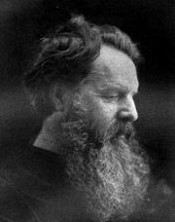Fields James T.

James Thomas Fields (December 31, 1817 – April 24, 1881) was an American publisher and author. Fields was born in Portsmouth, New Hampshire. His father was a sea captain and died before Fields was three.[1] At the age of 14, Fields took a job at the Old Corner Bookstore in Boston.[1] His first published poetry was included in the Portsmouth Journal in 1837 but he drew more attention when, on September 13, 1838, he delivered his "Anniversary Poem" to the Boston Mercantile Library Association.[2] In 1839, he joined William Ticknor and became junior partner in the publishing and bookselling firm known after 1846 as Ticknor and Fields, and after 1868 as Fields, Osgood & Company. With this company, Fields was the publisher of leading contemporary American writers, with whom he was on terms of close personal friendship. He was also the American publisher of some of the best-known British writers of his time, some of whom he also knew intimately. The first collected edition of Thomas De Quincey's works (20 vols., 1850-1855) was published by his firm. As a publisher, he was characterized by a somewhat rare combination of keen business acumen and sound, discriminating literary taste, and as a man he was known for his geniality and charm of manner. Ticknor and Fields built their company to have a substantial influence in the literary scene which writer and editor Nathaniel Parker Willis acknowledged in a letter to Fields: "Your press is the announcing-room of the country's Court of Poetry."[3] In 1854, Fields married his second wife, Annie Adams, who was an author herself. Ticknor and Fields purchased The Atlantic Monthly for $10,000 and, about two years later in May 1861, Fields took over the editorship when James Russell Lowell left.[4] In 1871, he retired from business and from his editorial duties and devoted himself to lecturing and writing. He also edited, with Edwin P. Whipple, A Family Library of British Poetry (1878). Fields died in Boston on April 24, 1881. He is buried at Mount Auburn Cemetery in Cambridge, Massachusetts. In addition to his work as a publisher and essayist, Fields wrote poetry. A number of his works are collected in his book Ballads and Verses published in 1880. This volume contains the poem Ballad of the Tempest, which includes the famous lines: His chief works were the collection of sketches and essays entitled Underbrush (1877) and the chapters of reminiscence composing Yesterdays with Authors (1871), in which he recorded his personal friendship with William Wordsworth, William Makepeace Thackeray, Charles Dickens, Nathaniel Hawthorne, Herman Melville and others. Annie Adams Fields wrote the biography Memoir of James T. Fields, by his Wife (Boston, 1881) and Authors and Friends (Boston, 1896), which also makes mention of him. James T. Fields was known in his lifetime as one of the most successful and shrewd book promoters, working at a time when bribery was typical in the publishing culture.[1] Hawthorne said he owed his success as a writer to him: "I care more for your good opinion than for that of a host of critics, and have excellent reason for so doing; inasmuch as my literary success, whatever it has been or may be, is the result of my connection with you".[1] Fields was particularly successful as a publisher because of his ability to build close relationships with writers. As author Rebecca Harding Davis said, he was "the shrewdest of publishers and kindest of men. He was the wire that conducted the lightning so that it never struck amiss."[5] After Fields's death, his friend Henry Wadsworth Longfellow wrote a poem called "Auf Wiedersehen" dedicated to him. Fields, along with Longfellow, is featured in the first and third of Matthew Pearl's novels, The Dante Club and The Last Dickens. Fields is also mentioned in the 1994 film version of Little Women.
do you like this author?
What readers are saying
What do you think? Write your own comment on this book!
write a commentWhat readers are saying
What do you think? Write your own comment on this author!
write a commentWhat readers are saying
What do you think? Write your own comment on this author!
write a commentif you like Fields James T. try:
readers also enjoyed
What readers are saying
What do you think? Write your own comment on this author!
write a commentif you like Fields James T. try:
readers also enjoyed
Do you want to exchange books? It’s EASY!
Get registered and find other users who want to give their favourite books to good hands!


